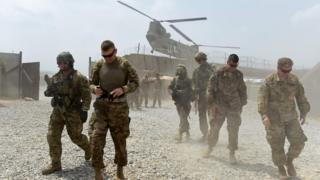Taliban co-founder in Qatar for US talks
One of the Afghan Taliban’s co-founders is in Qatar for peace talks between the insurgents and the United States.
Mullah Abdul Ghani Baradar spent eight years in Pakistani custody until his release last year.
His presence in Doha could help improve the chances of a deal being struck after several rounds of talks, correspondents say.
Last month’s US-Taliban talks in Qatar made progress in ending 17 years of conflict in Afghanistan, the US said.
US special envoy Zalmay Khalilzad said the January talks had been “more productive than they have been in the past” but added there were a number of issues still to work out.
He said a “draft framework” of a peace deal had been agreed, based around commitments by the US to withdraw international forces from Afghanistan, and from the Taliban not to allow jihadist groups to operate in the country.
The Taliban also said progress had been made in the negotiations. However, a spokesman added that talks about “unsolved matters” would continue.
The Taliban have so far refused to hold direct talks with Afghan officials, whom they dismiss as “puppets”. They say they will only begin negotiations with the government once a firm date for the withdrawal of US troops has been agreed.
Mullah Baradar was put in charge of the Taliban political office in Qatar in January but until now has remained in Pakistan and has not made any public appearances.
He served in a number of key roles within the Taliban, until he was detained by Pakistani authorities in 2010.
A senior Taliban figure told the BBC that Mullah Baradar’s authority within the group to make decisions could help “speed up the peace process”.
Taliban sources said it was not clear whether he would attend Monday’s talks but he would at least oversee them.
After last month’s talks, Taliban sources were quoted saying the two sides had finalised clauses to be included in a draft agreement.
They reportedly envisaged foreign forces withdrawing following a deal in return for assurances that al-Qaeda and the Islamic State (IS) group would not be allowed to use Afghanistan as a base to attack the US.
The Taliban’s power and reach have surged since foreign combat troops left Afghanistan in 2014.
Last month, Afghan President Ashraf Ghani said more than 45,000 members of the country’s security forces had been killed since he became leader in 2014.
It is estimated that about 15 million people – half the Afghan population – are living in areas either controlled by the Taliban or where the militants are openly present and regularly mount attacks.
On Sunday UN figures showed that more civilians were killed last year in Afghanistan than at any time since records began.
In December, reports emerged that the US was planning to withdraw about 7,000 troops – roughly half the remaining US military presence in the country.
Analysts warned that such a withdrawal could offer the Taliban a propaganda victory.
Who are the Taliban?
The Taliban emerged in the early 1990s following the withdrawal of Soviet troops from Afghanistan, shortly before the demise of the Soviet Union.
The militants ruled Afghanistan from 1996 to 2001, imposing a brutal version of Islamic law that included public executions and amputations, and the banning of women from public life.
They were driven from power by US-led troops following the 9/11 attacks which Washington blamed on al-Qaeda militants sheltered by the Taliban.
Source: Read Full Article



